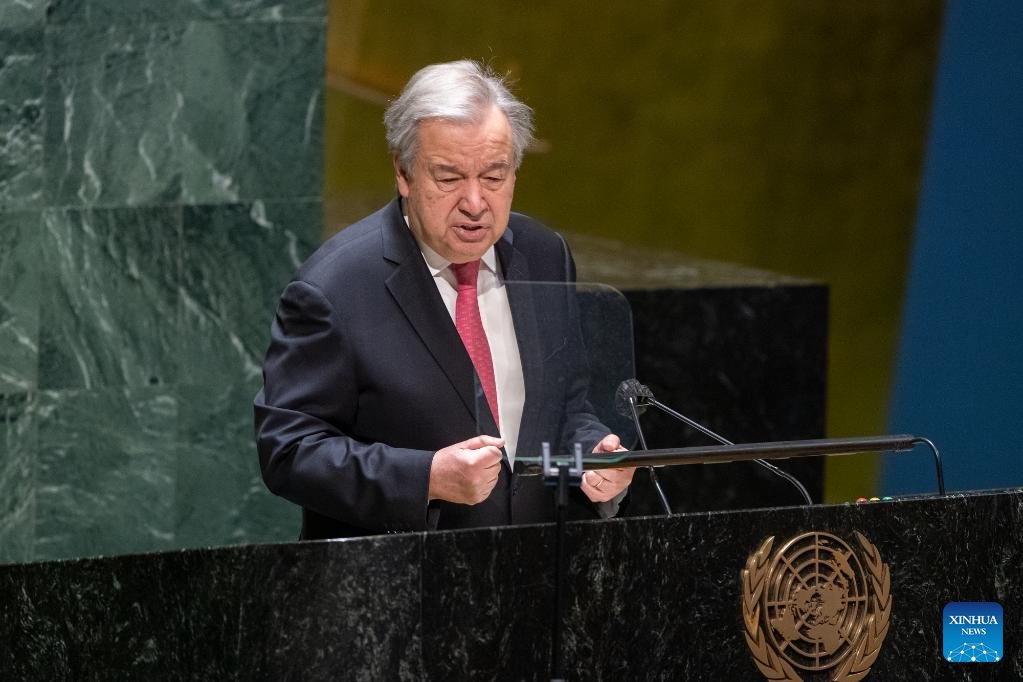UN chief raises five alarms for 2022

UN Secretary-General Antonio Guterres briefs the UN General Assembly on his priorities for 2022 at the UN headquarters in New York on Jan. 21, 2022. Antonio Guterres on Friday raised five alarms for the world for 2022. (Eskinder Debebe/UN Photo/Handout via Xinhua)
UN Secretary-General Antonio Guterres on Friday raised five alarms for the world for 2022.
"I want to begin the year by raising five alarms -- on COVID-19, global finance, climate action, lawlessness in cyberspace, and peace and security," he told the UN General Assembly in a briefing on his priorities for 2022. "We face a 5-alarm global fire that requires the full mobilization of all countries."
COVID-19 continues to upend lives, plans and hopes. The only certainty is more uncertainty. Meanwhile, inequalities are growing. Inflation is rising. The climate crisis, pollution and biodiversity loss rage on. The world faces a cauldron of political unrest and ferocious conflicts. Mistrust among world powers is reaching fever pitch. And the information superhighway is clogged with hatred and lies, giving oxygen to the worst impulses of humanity, he noted.
"All these challenges are, at heart, failures of global governance," he said. "From global health to digital technology, many of today's multilateral frameworks are outdated and no longer fit for purpose. They do not protect critical global public goods that are intended to support humanity's well-being -- from the global economy and finance systems to the health of our planet. Nor are multilateral frameworks delivering on our common aspirations for peace, sustainable development, human rights and dignity for all."
"We all know this. Now is not the time to simply list and lament challenges. Now is the time to act," said Guterres.
The world must go into emergency mode in the COVID-19 battle, he said.
Omicron is yet another warning. The next variant may be worse. Stopping the spread anywhere must be at the top of the agenda everywhere, he said.
Actions must be grounded in science and common sense. The science is clear: vaccines work, vaccines save lives. But the distribution of vaccines is scandalously unequal, he said. "Instead of the virus spreading like wildfire, we need vaccines to spread like wildfire. We need all countries and all manufacturers to prioritize vaccine supply to COVAX and create the conditions for the local production of tests, vaccines and treatments in so many countries able to do it around the world."
The World Health Organization in October 2021 unveiled a strategy to vaccinate 40 percent of people in all countries by the end of 2021, and 70 percent by the middle of 2022, he noted. "We are nowhere near these targets. Vaccination rates in high-income countries are seven times higher than in the countries of Africa. At this rate, Africa will not meet the 70 percent threshold until August 2024."
There is also a need to fight the plague of vaccine misinformation. More needs to be done to ready the world for the next outbreak, including by strengthening the authority of the World Health Organization, he said.
The world must go into emergency mode to reform global finance, said Guterres.
"Let's tell it like it is: the global financial system is morally bankrupt. It favors the rich and punishes the poor," he said. One of the main functions of the global financial system is to ensure stability by supporting economies through financial shocks. Yet faced with precisely such a shock -- a global pandemic -- it has failed the Global South.
Lopsided investment is leading to a lopsided recovery. Low-income countries are experiencing their slowest growth in a generation. Many middle-income countries are ineligible for debt relief despite surging poverty and the growing impact of the climate crisis. Women and girls, who represent the majority of poor in most regions, are paying a high price in lost health care, education and jobs, he noted.
"Unless we take action now, record inflation, soaring energy prices and extortionate interest rates could lead to frequent debt defaults in 2022, with dire consequences for the poorest and most vulnerable," he warned.
The divergence between developed and developing countries is becoming systemic -- a recipe for instability, crisis and forced migration. These imbalances are not a bug, but a feature of the global financial system. They are inbuilt and structural. They are the product of a system that routinely ascribes poor credit ratings to developing economies, starving them of private finance, he said.
"Since the start of the pandemic, I have called for reform of the global financial system to support the needs of developing countries through an inclusive and transparent process. To build a strong recovery, governments need the resources to invest in people and resilience, through national budgets and plans anchored in the Sustainable Development Goals. All countries must be able to invest in strong health and education systems, job creation, universal social protection, gender equality and the care economy, and a just transition to renewable energy," he said.
"This requires a serious review of global financial governance mechanisms, which are dominated by the richest economies in the world." he added.
Reforming the global financial architecture requires an operational debt relief and restructuring framework. It means redirecting the Special Drawing Rights of the International Monetary Fund to countries that need help now. It requires a fairer global tax system, in which some of the trillions amassed by billionaires during the pandemic are shared more broadly. It means addressing illicit financial flows. It requires boosting the resources of multilateral development banks so they can better support developing economies, both directly and by leveraging private investment, he said.
The world must go into emergency mode against the climate crisis, said the UN chief.
The world is far off-track on climate action. There is a need for a 45 percent reduction in global emissions by 2030 to reach carbon neutrality by mid-century. Yet, according to present commitments, global emissions are set to increase by almost 14 percent over the current decade. That spells catastrophe, he said.
"This year, we need an avalanche of action. All major-emitting developed and developing economies must do much more, much faster, to change the math and reduce the suffering, taking into account common but differentiated responsibilities."
Every country must strengthen its Nationally Determined Contribution until all countries collectively deliver the 45 percent emissions reduction needed by 2030. Wealthier countries must finally make good on the 100-billion-U.S. dollar climate finance commitment to developing countries, starting in 2022, he said.
The world must go into emergency mode to put humanity at the center of technology, an area where global governance barely exists, said Guterres.
"Technology shouldn't use us. We should use technology. And if governed properly, the opportunities are extraordinary, especially if we can ensure safe and secure internet connectivity everywhere. But growing digital chaos is benefiting the most destructive forces and denying opportunities to ordinary people," he said.
As people seize the opportunities of the digital world, risks like data misuse, misinformation and cybercrime are already outpacing any meaningful efforts to address them.
The business models of social media companies profit from algorithms that prioritize addiction, outrage and anxiety at the cost of public safety. There is a need for strong regulatory frameworks to change this business model, he said.
To address these issues, he said, he has proposed a Global Digital Compact as part of the Summit of the Future in 2023. The compact will bring together governments, the private sector and civil society to agree on key principles underpinning global digital cooperation.
He said he has also proposed a Global Code of Conduct to end the "infodemic" and the war on science, and promote integrity in public information, including online.
He also urged UN member states to speed up work on banning lethal autonomous weapons and to begin considering new governance frameworks for biotechnology and neurotechnology.
The world needs to go into emergency mode to bring peace, said Guterres.
The world faces the highest number of violent conflicts since 1945. Military coups are back. Impunity is taking hold. Nuclear weapons stockpiles now exceed 13,000, the highest level in decades. Human rights and the rule of law are under assault. Populism, nativism, white supremacy and other forms of racism and extremism are poisoning social cohesion and institutions everywhere, he said.
Meanwhile, the climate crisis is fueling conflict and escalating humanitarian crises. And terrorism remains a constant threat, further destabilizing some of the most fragile countries in the world, he added.
"This world is too small for so many hot spots. We need a united Security Council, fully engaged in addressing them. Geopolitical divides must be managed to avoid chaos around the globe. We need to maximize areas for cooperation while establishing robust mechanisms to avoid escalation."
The fact that there are so many conflicts in the world is yet more evidence that much more money and resources are being spent on managing conflicts than on preventing them and building peace, he said. "We need to seriously review our priorities and resources across the peace continuum, strengthening investment in prevention and peacebuilding. Across all these challenges, the world needs a strong and effective United Nations to deliver results."
The world's responses to the five emergencies will determine the course of people and planet for decades to come. The world must go into emergency mode and put out this 5-alarm fire -- by fighting the COVID-19 pandemic, reforming the global financial system to ensure a just recovery, tackling the climate crisis, putting humanity at the center of the digital world and frontier technologies, and delivering sustainable peace, he said.
"My report on Our Common Agenda, which strengthens Agenda 2030 and the Sustainable Development Goals, offers a roadmap to gather the world together in solidarity to address these governance challenges and reinvigorate multilateralism for the 21st century. Together, let's make 2022 a year in which we forge a new, more hopeful and equal path," said Guterres.
UN Secretary-General Antonio Guterres briefs the UN General Assembly on his priorities for 2022 at the UN headquarters in New York on Jan. 21, 2022. Antonio Guterres on Friday raised five alarms for the world for 2022. (Eskinder Debebe/UN Photo/Handout via Xinhua)
Photos
Related Stories
- Senior UN official commends China's proactive role in fostering development cooperation
- Distance, volcanic ash delay Tonga aid: UN
- UN chief voices concern over Saudi-led coalition's airstrikes on Yemen's Sanaa
- Tonga volcano relief efforts face challenges: UN
- UN, agencies prepare relief efforts following Tonga volcano eruption
- UN ready to assist Tonga after volcano eruption, tsunami
- Global economy projected to grow by 4 pct in 2022, 3.5 pct in 2023 -- UN report
- UN distributes winter items to displaced families in Libya's Tawergha
- UN envoy welcomes meeting of Libyan military leaders
- Chinese envoy voices concern over security situation in occupied Palestinian territory
Copyright © 2022 People's Daily Online. All Rights Reserved.










